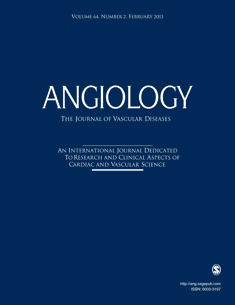
ANGIOLOGY
Scope & Guideline
Pioneering Research in Cardiovascular Medicine
Introduction
Aims and Scopes
- Vascular Disease Management:
Research on the clinical management of vascular diseases, including peripheral artery disease, coronary artery disease, and venous thromboembolism, focusing on treatment strategies and patient outcomes. - Predictive Biomarkers:
Investigation of various biomarkers, such as the Systemic Immune-Inflammation Index and C-Reactive Protein/Albumin Ratio, for predicting cardiovascular events and outcomes in patients with vascular diseases. - Risk Assessment Models:
Development and validation of risk assessment models and scores (e.g., CHA2DS2-VASc, SYNTAX score) aimed at improving the prediction of cardiovascular events and guiding clinical decision-making. - Inflammation and Cardiovascular Health:
Exploration of the role of inflammation in cardiovascular diseases, including studies on inflammatory markers and their association with disease progression and outcomes. - Technological Advancements in Vascular Interventions:
Research on new technologies and techniques in vascular interventions, including the use of imaging modalities and novel therapeutic approaches to improve patient outcomes. - Gender and Ethnicity Disparities:
Examination of the differences in cardiovascular disease presentation, management, and outcomes based on gender and ethnicity, highlighting the need for tailored approaches in treatment.
Trending and Emerging
- Artificial Intelligence in Vascular Medicine:
The integration of artificial intelligence and machine learning in vascular disease diagnosis and management is gaining traction, with studies exploring its potential to enhance decision-making and patient outcomes. - Long COVID and Vascular Implications:
Research examining the vascular implications of long COVID is emerging, focusing on how COVID-19 affects vascular health and contributes to long-term cardiovascular complications. - Personalized Medicine Approaches:
There is an increasing focus on personalized medicine in vascular health, emphasizing tailored treatment strategies based on individual patient profiles, including genetic, environmental, and lifestyle factors. - Vascular Aging and Its Impact on Health:
Research into the mechanisms of vascular aging and its relationship with cardiovascular diseases is on the rise, highlighting the need for strategies to prevent age-related vascular decline. - Impact of Lifestyle Factors on Vascular Health:
Studies examining the effects of lifestyle factors, such as diet, exercise, and smoking cessation, on vascular health and disease outcomes are emerging as important areas of research.
Declining or Waning
- Traditional Risk Factors for Cardiovascular Disease:
Research focusing solely on traditional risk factors (such as hypertension, hyperlipidemia, and smoking) has decreased, as newer studies emphasize the importance of inflammatory markers and complex interactions in cardiovascular health. - Basic Research on Vascular Biology:
There appears to be a decline in the publication of basic laboratory studies exploring fundamental vascular biology, as the journal shifts towards more clinically relevant and translational research. - Single-Cause Studies:
Research focusing on singular causes of vascular diseases (e.g., a specific genetic mutation or isolated risk factor) has become less common, with a trend towards more integrative approaches that consider multiple factors and interactions. - General Reviews without New Insights:
The journal has moved away from publishing general review articles that do not provide new insights or advancements in the field, favoring more original research and systematic reviews with meta-analyses.
Similar Journals
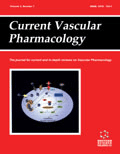
Current Vascular Pharmacology
Connecting Researchers for a Healthier Vascular FutureCurrent Vascular Pharmacology is a premier academic journal published by Bentham Science Publications Ltd, focusing on the intersection of pharmacology and cardiovascular medicine. With an impact factor that reflects its significance in the field, this journal ranks in the Q1 category for both Pharmacology and Cardiology, showcasing its dedication to high-quality research. Its Scopus ranks place it in the top percentile of its categories, highlighting its influence among scholars and practitioners alike. Issued since 2003 and continuing through 2024, Current Vascular Pharmacology aims to disseminate cutting-edge findings and foster knowledge exchange among researchers, professionals, and students engaged in cardiovascular pharmacology. Despite being a subscription-based journal, it remains a vital resource for those seeking the latest advancements in drug development and therapeutic interventions for vascular diseases. Located in the United Arab Emirates, the journal serves as an essential platform for global discourse on vascular health.
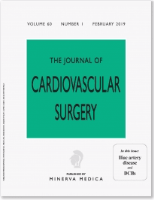
JOURNAL OF CARDIOVASCULAR SURGERY
Elevating surgical standards in cardiovascular care.JOURNAL OF CARDIOVASCULAR SURGERY, published by EDIZIONI MINERVA MEDICA, stands as a pivotal resource in the field of cardiovascular medicine and surgical practices. With a rich history dating back to 1960 and ongoing contributions scheduled until 2024, this esteemed journal provides a platform for the dissemination of innovative research in cardiology and surgical techniques. Registered under ISSN 0021-9509 and E-ISSN 1827-191X, it holds a commendable standing reflected in its Scopus rankings, placing it in the second quartile for both cardiology and cardiovascular medicine, as well as surgery. Despite not currently offering Open Access, the journal remains a vital source for practitioners and researchers alike, facilitating a deeper understanding of advancing methodologies and clinical practices in cardiovascular surgery. The journal is headquartered in Turin, Italy, and is committed to nurturing academic excellence within the community, making it an essential read for professionals, researchers, and students striving to enhance their knowledge and expertise in this critical field.
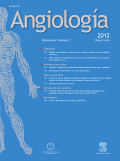
Angiologia
Connecting researchers and practitioners in vascular health.Angiologia, published by ARAN EDICIONES, S A, serves as a vital platform for the dissemination of research and advancements in the fields of cardiology and cardiovascular medicine. Established in 1949, this Spanish journal has made significant contributions to understanding vascular health, although it currently holds a Q4 status in Scopus rankings, indicating a critical opportunity for emerging researchers to contribute to this evolving field. Spanning from 1949 to 1993 and resuming from 1996 to 2024, the journal reflects a rich history of academic discourse. With its ISSN 0003-3170 and E-ISSN 1695-2987, Angiologia is committed to enhancing the visibility of cardiovascular research, providing access to a diverse range of articles that cater to the needs of healthcare professionals, academics, and students aiming to deepen their understanding of angiological health. While the journal currently does not offer open access options, it remains significant in guiding future research and fostering innovations within the cardiology landscape.

Phlebolymphology
Championing knowledge for a healthier vascular future.Phlebolymphology is a pivotal academic journal dedicated to advancing the field of vascular medicine, focusing on the intricate relationship between the venous and lymphatic systems. Published by Laboratoires Servier, this journal has been a significant platform for disseminating high-quality research and clinical findings since its inception in 1996, with coverage having extended from 1998 to 2017. Although it has discontinued its presence in Scopus, the journal remains a respected source within the realms of cardiology and cardiovascular medicine, currently ranked in the 19th percentile among its peers. While Phlebolymphology does not offer open access, its contributions are essential for practitioners, researchers, and educators looking to deepen their understanding of vascular diseases and treatments. With a commitment to promoting innovative research and clinical insights, Phlebolymphology plays an important role in shaping health care practices relating to venous and lymphatic health.

IJC Heart & Vasculature
Pioneering Insights for Heart Health ExcellenceIJC Heart & Vasculature is a premier open-access journal published by Elsevier Ireland Ltd, dedicated to advancing research in the fields of cardiology and cardiovascular medicine. Since its inception in 2013, this journal has established itself as a valuable resource for clinicians, researchers, and students keen on exploring the latest developments in heart and vascular health. With an impressive impact factor and ranked within Q2 in its category (2023), IJC Heart & Vasculature has achieved a significant Scopus rank of #125 out of 387, placing it in the 67th percentile of cardiology journals. The journal not only emphasizes high-quality research but also promotes innovative studies that can shape clinical practices and improve patient outcomes. Researchers and professionals can access a plethora of peer-reviewed articles, original research, and comprehensive reviews that unravel the complexities of cardiovascular science. With a commitment to fostering open and impactful dialogue in the field, IJC Heart & Vasculature is poised to be an essential platform for knowledge exchange in the evolving landscape of cardiovascular research.

Indian Journal of Vascular and Endovascular Surgery
Fostering Collaboration in Vascular ResearchThe Indian Journal of Vascular and Endovascular Surgery, published by Wolters Kluwer Medknow Publications, serves as a premier platform dedicated to advancing research and clinical practices in the fields of vascular and endovascular surgery. With an E-ISSN of 2394-0999 and a commitment to open access since 2015, this journal provides invaluable insights to researchers, professionals, and students alike, fostering a collaborative environment for the dissemination of knowledge. By focusing on innovative techniques, case studies, and systematic reviews, the journal plays a vital role in enhancing clinical outcomes and promoting evidence-based practices within the vascular community. Its commitment to high-quality research and accessibility positions it as an essential resource in the landscape of surgical literature, encouraging further exploration and collaboration within this critical area of healthcare.

EJVES Vascular Forum
Bridging Disciplines, Enhancing Vascular KnowledgeEJVES Vascular Forum, published by Elsevier, is a premier open access journal focusing on the interdisciplinary field of vascular surgery and cardiovascular medicine. Since its inception in 2001, the journal has provided a vital platform for the dissemination of high-quality research and innovative clinical practices, addressing critical issues in vascular health. With an ISSN of 2666-688X, it has gained recognition within its community, attaining a Q3 quartile ranking in both cardiology and surgery categories as of 2023, and showcasing its relevance and impact within the medical research landscape. Situated in the United Kingdom and accessible globally, the EJVES Vascular Forum invites contributions that foster collaboration and enhance knowledge in vascular surgery, making it an essential resource for researchers, professionals, and students alike. The journal's ranking within Scopus highlights its position among peers, adding further credence to its objectives of advancing science and improving patient care in the cardiovascular realm. By publishing rigorously peer-reviewed articles, the journal aims to be the go-to source of information and innovation for those dedicated to the progress of vascular health.

Acta Angiologica
Connecting Researchers to the Heart of AngiologyActa Angiologica, published by VIA MEDICA, is an Open Access journal dedicated to the dynamic field of cardiology and cardiovascular medicine. Since its inception in 1995, this esteemed journal has provided a vital platform for the dissemination of cutting-edge research and innovative medical practices, especially pertinent to vascular health. Being indexed in Scopus, it holds a rank of #352 out of 387 in its category for 2023, positioning it in the 9th percentile among contemporaneous journals. The journal's commitment to scholarly excellence and accessibility is underscored by its embrace of open access publishing, allowing researchers, professionals, and students to engage with vital advancements in the field without financial barriers. With a converged timeline from 2005 to 2024, Acta Angiologica continues to play a crucial role in bridging gaps in cardiovascular knowledge, fostering collaboration across disciplines, and advancing the implementation of preventative and therapeutic strategies in vascular medicine. Located in Gdansk, Poland, the journal is poised to make significant contributions to the cardiovascular research landscape.
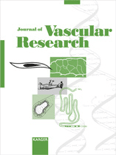
JOURNAL OF VASCULAR RESEARCH
Exploring the frontiers of cardiovascular science.Welcome to the JOURNAL OF VASCULAR RESEARCH, a reputable academic journal published by KARGER that has been a cornerstone of vascular research since 1964. With an ISSN of 1018-1172 and an E-ISSN of 1423-0135, this journal plays a vital role in disseminating cutting-edge research in the fields of Cardiology and Cardiovascular Medicine and Physiology. Currently categorized in the Q3 quartile for both disciplines, it ranks as #179 in Cardiology and #131 in Physiology according to Scopus, showcasing its significant contribution to the scientific community. Although the journal operates on a subscription basis, it strives to provide accessible content that informs and inspires researchers, professionals, and students alike. As the journal looks forward to its convergence in 2024, it continues to uphold its mission of advancing knowledge, fostering innovation, and encouraging collaboration within the dynamic realm of vascular research.
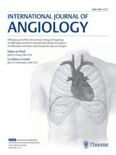
International Journal of Angiology
Advancing cardiovascular knowledge for a healthier tomorrow.Welcome to the International Journal of Angiology, a distinguished publication dedicated to advancing the field of cardiology and cardiovascular medicine. Published by THIEME MEDICAL PUBL INC, this journal plays a crucial role in disseminating innovative research and clinical insights from 1992 through 2024, serving as a vital resource for researchers, healthcare professionals, and students alike. With an ISSN of 1061-1711 and an E-ISSN of 1615-5939, the journal currently holds a respectable Q4 ranking in the cardiology field, reflecting its commitment to quality and relevance. Although it operates under a traditional access model, the journal ensures that critical research findings are shared with a broad audience, fostering collaboration and knowledge exchange. By exploring current trends, diagnostic techniques, and treatment modalities in angiology, the International Journal of Angiology remains an essential platform for those dedicated to improving cardiovascular health around the globe.